新概念第二册第29课
新概念英语第二册29课作文和书信写作

新概念英语第二册29课作文和书信写作全文共6篇示例,供读者参考篇1My Summer VacationThe last day of school finally came and I was so excited for summer vacation! No more waking up early, no more homework, and two whole months to play and have fun. My parents had promised we could go on a big trip this year since I did so well in school. I could hardly wait!The first week of summer, I just lazed around the house watching TV, playing video games, and annoying my little sister. My dad still had to go to work, but my mom was home to make sure we didn't get into too much trouble. We went to the pool almost every day since it was so hot out.Finally, it was time for our big vacation! We packed our suitcases and headed to the airport bright and early one Monday morning. I had never been on a plane before, so I was a little nervous but also really excited. The plane was huge inside with lots of tiny windows to look out. I got the window seat, which made me happy.After a few hours in the air, the captain announced we would be landing soon in California! I had never been to California before. When we landed and walked outside, it was warm and sunny, but not too hot like back home. We took a shuttle to our hotel right on the beach in a place called Santa Monica. Our room had an ocean view and I could see the famous Santa Monica Pier from our window. I couldn't wait to go explore!The next day, we walked down to the pier and rode the big ferris wheel and roller coaster. I had so much fun! We also went to the beach and I played in the waves and built sandcastles. That night we went to the Third Street Promenade which had street performers, shops, and restaurants. We ate the most delicious pizza at one of the outdoor cafes. I had never had pizza that good before!A few days later, we drove down the coast to San Diego. We visited the world-famous San Diego Zoo, which had pandas, polar bears, gorillas, and every animal you can imagine! My favorite was watching the monkey show where the monkeys did funny tricks. We also went to SeaWorld and I got to pet a dolphin. We saw Shamu the killer whale do big splashy jumps during the whale show.My mom's cousin lives in Los Angeles, so we went to visit her next. She took us to see the Hollywood Walk of Fame where you can see handprints from all the big movie stars. We also drove all the way up to the Griffith Observatory which had an amazing view of the whole city and the famous Hollywood sign. I felt like I was in a movie myself!On our last days in California, we drove up the coast to the beach town of Santa Barbara. It was such a pretty area with the mountains right by the ocean. We walked around the downtown area full of cute shops and ate delicious seafood on an outdoor patio. We also visited a место called the Old Mission which had beautiful old buildings and gardens. It felt like going back in time.Way too soon, it was time to head back home. I was really sad for our vacation to be over. We had so much fun exploring California - seeing the ocean, going to the theme parks, and experiencing a different part of the country. It will be a vacation I'll never forget!Now that I'm back, summer still isn't over yet which is lucky for me. I've been spending my days riding my bike, swimming at the local pool, having sleepovers with friends, and driving my parents crazy. School will be starting again before I know it, soI'm trying to soak up every last bit of summer freedom. Maybe my parents will take us on another vacation again next year if I get good grades! A kid can dream, right?篇2My Wonderful Summer VacationSummer vacation is the best time of the year! No school, no homework, just weeks and weeks of fun and freedom. This summer was extra special because my family went on an amazing trip to the beach. I'm going to tell you all about it!We left bright and early one Saturday morning. Mom packed a huge cooler full of sandwiches, snacks, and drinks for the drive. Dad loaded up the car with our suitcases, beach toys, boogie boards, and everything else we might need. My little brother Timmy and I could barely contain our excitement!After what felt like forever in the car, we finally arrived at the beach house we had rented for the week. It was a cute little blue house just a few blocks away from the ocean. As soon as we walked in, you could smell the salty sea air. Timmy and I raced to claim the bedrooms while Mom and Dad got everything unpacked.Later that afternoon, we went to the beach for the first time. The sand was warm between my toes and the ocean looked so big and blue. Timmy and I spent hours playing in the waves and making sand castles. We found all kinds of cool shells too. Every night after the beach we had to take a bath to wash off all the sand!On the second day, we went mini golfing at a coolpirate-themed course. There were waterfalls, caves, and even a replica pirate ship! My putting skills aren't the greatest so the obstacles made it extra challenging. Timmy did better than me, as usual. We got a kick out of the silly pirate jokes and soundtrack playing throughout the course.One of my favorite parts of the trip was visiting the aquarium. They had an amazing walk-through tunnel where you could see sharks, rays, and all sorts of fish swimming just feet away. I was a little scared at first but it was so amazing! We also got to pet some sting rays and learned a ton of facts about ocean creatures from the guides.Another day we rented beach cruiser bicycles and rode for miles along the waterfront trail. The salty air felt so refreshing as we rode. We stopped for ice cream at a little shop right on the beach. After burning all those calories biking, I deserved adouble scoop cone! Chocolate and strawberry - my favorite combo.The sunsets at the beach were magical. Just before dusk each night, we'd bundle up in our beach towels and watch the sky turn brilliant shades of pink, purple, and orange. Sometimes we'd see dolphins jumping in the waves as the sun slipped below the horizon. Those moments made me feel so small but in an amazing way.Towards the end of our stay, there was a night when we could see a meteor shower perfectly from the beach. Timmy and I bundled up in sleeping bags and set up camp right on the sand to watch the shooting stars. We must have seen dozens of them streaking across the sky! Every time we saw one we'd yell "Shooting star!" and make a wish. I lost count of how many wishes I made.On our very last day, we went on a dolphin watching cruise. The tour guide said we were almost guaranteed to spot some since they hung around the area. About halfway through the cruise, we hit the jackpot - hundreds of dolphins started swimming and leaping alongside the boat! We could hear them chattering away as they gracefully arced out of the water. Seeing them swim freely in their natural habitat was just beautiful.After a whirlwind week of fun in the sun, it was time to pack up and head home. I was so sad to leave but also full of incredible memories. Timmy and I slept like logs in the car ride back, sunburned but happy kids.Now that I'm back at school, whenever I daydream during class, I picture myself back on that beach. I can almost feel the warm sand and taste the salty sea breeze again. Playing in the ocean waves, riding bikes with my family, watching the sunset...those simple pleasures brought me so much joy.Summer may be over, but I have a lifetime of wonderful memories from this trip. I'm already dreaming about where we might vacation next summer. A national park? City sights? Forest cabin? Wherever we go, I know more adventures and unforgettable family moments await. I feel so lucky to have parents who take us on journeys to explore the amazing world around us.For now, I'll just have to be patient and keep working hard at school. Maybe if I get straight A's, Mom and Dad will take us somewhere extra special next summer! A kid can dream, right? I'm holding onto that motivation as I tackle my Math homework and English essays. After this taste of summer bliss, I have a tonof great writing inspiration about sun, sand, and making magical memories.篇3My Trip to the BeachLast summer, my family and I went on a trip to the beach. I was so excited because I love the beach! We packed up the car with our suitcases, beach toys, towels, and snacks for the drive. It took us three hours to get to the beach town where we were staying.When we arrived, I could smell the salty air and hear the waves crashing against the shore. We checked into our hotel room and I immediately wanted to go play in the sand. Mom said we had to unpack first and put on our swimsuits. I quickly threw my clothes into the dresser drawers so we could hurry up and go!Finally, we made it out to the beach. The sand was so hot that it burned my feet a little at first. I ran straight for the water and stuck my toes in - it was freezing cold! But after adjusting, it felt wonderful. The waves would rush up and then pull back, leaving little trails in the sand. I spent hours playing in the waves,letting them crash into me, and burying my brother up to his neck in the sand.In the late afternoon, we built a giant sandcastle. We used buckets to make turrets and molded stairs and windows out of the wet sand. I found some sticks and seaweed to decorate it. Just as we were finishing, a huge wave came up and knocked part of it down! We weren't too sad though because we had so much fun building it together.That evening, we had a bonfire and roasted marshmallows. I love the way they get all gooey inside their crispy outer shell. We gazed up at the stars which looked so bright and countless out there away from the city lights. Exhausted, we went to bed early, and I fell asleep to the soothing sound of the waves outside our room.The next day, we woke up early to watch the sunrise over the ocean. The sky turned crimson and golden hues as the sun peeked up from the horizon. What a incredible sight! We had a breakfast picnic on the beach of sandwiches, fruit, and juice boxes.Later, we played some beach games like frisbee, paddleball, and burying each other in the sand again. I practiced skipping rocks and seeing how far I could throw them into the water. Forlunch, we had fresh-caught fish, shrimp, fries and lemonade at a beachside restaurant with a great view.In the afternoon, we went exploring and hiking along some rocky cliffs and paths with beautiful views of the crashing waves below. We saw gulls, crabs, starfish, and other marine creatures in the tide pools. I'll never forget the powerful scent of the sea air.Our final night, we went to the busy boardwalk area which was full of game booths, rides, music, food vendors, and tons of people. We went on the ferris wheel and roller coaster, which was a little scary but so fun! We ate cotton candy, caramel apples, and I tried my first funnel cake which was absolutely delicious. We played games and won a big stuffed teddy bear for me.I was so sad when it was time to leave the next morning. I had the best time ever and made so many incredible memories. I will never forget the wonderful sights, smells, and sounds of the beach. I really hope we can go back again next summer! I already can't wait.篇4My Exciting Summer VacationHello, my name is Emma, and I'm 10 years old. I just started the 5th grade, and my teacher asked us to write about what we did during our summer vacation. I had the most amazing summer ever, and I can't wait to share my adventures with you!It all began on the last day of school when my mom and dad told me we were going on a big trip. They said we were going to drive across the country and visit some of the most beautiful national parks in the United States. I was so excited I could hardly sleep the night before we left!Our first stop was the Grand Canyon National Park in Arizona. When we arrived, I couldn't believe my eyes. The canyon was so huge and deep, and the colors of the rocks were breathtaking. We went on a hike along the rim trail, and our guide taught us all about the geology and history of the canyon. Did you know it took millions of years for the Colorado River to carve out that massive gorge?After a few days at the Grand Canyon, we drove to Zion National Park in Utah. This park was like something out of a fairy tale, with towering red and white sandstone cliffs and narrow canyons. We went on a guided horseback ride through the park, and I got to see some of the most stunning rock formations upclose. My favorite was the one called "The Narrows" – a narrow canyon with walls over 1,000 feet tall!Next, we visited Yellowstone National Park in Wyoming. This place was like a real-life science museum, with geysers, hot springs, and bubbling mud pots everywhere. We saw Old Faithful, the famous geyser that erupts every 90 minutes or so, sending a huge plume of hot water and steam into the air. We also went on a wildlife watching tour and saw bison, elk, and even a grizzly bear from a safe distance!Our final stop was Glacier National Park in Montana. This park was absolutely breathtaking, with towering mountain peaks, crystal-clear lakes, and massive glaciers. We went on a guided hike to a place called the Grinnell Glacier Overlook, and the views were simply stunning. Our guide told us that many of the glaciers in the park are melting due to climate change, which made me feel sad. I hope we can do something to protect these amazing natural wonders.In between our visits to the national parks, we stopped at some really cool places along the way. We visited Mount Rushmore in South Dakota and saw the huge carved faces of four former presidents. We also went to the Crazy HorseMemorial, a massive sculpture carved into the side of a mountain that honors the famous Native American leader.One of my favorite stops was in Wall, South Dakota, where we visited the quirky and fun Wall Drug Store. This place was like a wild west town straight out of a movie, with all kinds of cool shops and attractions. We got to see a animatronic cowboy show, and I even got to pan for real gold!Throughout our trip, we stayed in some really fun places, like rustic cabins, tepees, and even a retro Airstream trailer. We roasted marshmallows over campfires, told spooky stories, and spent our nights gazing up at the incredibly starry skies.Overall, this was the best summer vacation ever. I got to see so many amazing natural wonders and learn so much about the history and culture of our country. I made memories that will last a lifetime, and I can't wait to go on another adventure like this someday.Thank you for reading about my exciting summer vacation. I hope you enjoyed hearing about all the cool places I visited and the fun things I did. Maybe you can plan a similar trip with your family someday! Until next time, happy trails!篇5Title: My Unforgettable Summer VacationIt was the last day of school before the summer holidays, and I couldn't wait to go home and start my vacation. I had so many plans for the summer – playing outside with my friends, going on trips with my family, and of course, not having to worry about homework or exams for a while!The first few days of the holidays were spent lazing around at home, watching TV, and playing video games. But soon, I started to get bored. That's when my mom suggested that we go on a family trip to the countryside. She said it would be a great opportunity for me to experience life away from the city and get some fresh air.At first, I wasn't too excited about the idea. I mean, what's so great about the countryside? But my mom insisted, and before I knew it, we were packing our bags and getting ready for the trip.We left early one morning and drove for a couple of hours until we reached a small village nestled in the heart of the countryside. The first thing that struck me was how quiet and peaceful it was. There were no honking cars or noisy construction sites like back home. Instead, all I could hear were the chirping of birds and the gentle rustling of leaves in the breeze.We were staying at a quaint little farmhouse owned by my aunt and uncle. As soon as we arrived, they greeted us with warm hugs and showed us around their property. They had a big vegetable garden, a small orchard, and even a few chickens and a goat. I had never seen anything like it before!The next few days were filled with all sorts of new experiences for me. In the mornings, my uncle would take me to the garden, and we would water the plants and pick fresh vegetables for our meals. It was so much fun getting my hands dirty and learning about where our food comes from.In the afternoons, we would often go on long walks through the nearby fields and forests. My aunt and uncle would point out different kinds of plants and animals, and I was amazed by the variety of life that existed in the countryside. Back home, the only wildlife I ever saw were pigeons and squirrels.One of my favorite memories from the trip was when my uncle took me fishing at a nearby pond. I had never been fishing before, but he patiently taught me how to bait the hook and cast the line. After a few failed attempts, I finally caught my first fish –a tiny little thing, but I was so proud of myself!In the evenings, we would sit around a campfire and roast marshmallows while my aunt and uncle told us stories abouttheir childhood in the countryside. It was so cozy and peaceful, and I loved listening to their tales of adventure and mischief.As the days went by, I found myself becoming more and more attached to the simple, peaceful way of life in the countryside. I loved waking up to the sound of roosters crowing and the smell of freshly baked bread wafting in from the kitchen.I loved spending time outdoors, exploring the natural world and learning about the plants and animals that lived there.Before I knew it, our vacation was coming to an end, and it was time to head back home. As we drove away from the farmhouse, I felt a twinge of sadness. I was going to miss the fresh air, the wide-open spaces, and the slower pace of life in the countryside.But more than anything, I was grateful for the experience. It had opened my eyes to a whole new world, one that I had never really appreciated before. I realized that there was so much more to life than just sitting in front of a screen all day, and that sometimes, the simplest things can be the most rewarding.As we pulled into our driveway back in the city, I made a silent promise to myself that I would never forget the lessons I had learned during that unforgettable summer vacation in thecountryside. And who knows, maybe one day I'll even get to live that way permanently.篇6New Concept English - Writing Stories and LettersHi there! My name is Emma and I'm 10 years old. I love learning English and my favorite part is when we get to write stories and letters. Mrs. Roberts, my English teacher, just taught us all about it in New Concept English Book 2 Lesson 29. Let me tell you what I learned!Writing StoriesOne of the best things we can write is stories. Mrs. Roberts says stories allow us to use our creativity and imagination. When writing a story, we first need to decide what it will be about - the plot. Will it be about a brave knight rescuing a princess? Or maybe about a group of friends going on an awesome adventure? The possibilities are endless!Once we have the plot idea, we need characters. Characters are the people, animals or creatures that the story is about. My favorite characters to write about are talking animals becausethey can do funny human things. Like a dog that goes to school or a cat that bakes cookies!After the plot and characters, we need to decide the setting. The setting is where and when the story takes place. My stories usually happen in magical forests or on beaches with purple sand. Using descriptive words to paint a picture of the setting with your words is important.Then it's time to actually write the story! We start with an introduction that sets up the characters and setting. Then we have the events that make up the plot happening one after another. There should be a problem or obstacle that the characters have to overcome. Finally, there is the conclusion where the problem is resolved and we describe how it all ended.Mrs. Roberts taught us some tips for good story writing:Use interesting words to describe things, not boring onesWrite dialogue (the conversations between characters) to make it feel more realDon't give away the ending too soon - have some surprises!Check your spelling and grammarI love writing stories because you can make literally anything happen. A dog can fly, a cat can talk, a boy can shrink down tiny. Nothing is off limits in your imagination!Writing LettersAnother main thing we learn about in Lesson 29 is how to properly write letters. Letters can be to friends, family members, or even authors or famous people you admire. There are two main types - informal letters to people you know well, and formal letters which are more proper and professional.For informal letters, you start with the date at the top. Then a greeting like "Dear Mom" or "Hi Frankie". The body is where you write your message and update them on what's happening in your life. You can write it in a very casual, conversational style like you're talking to them. At the end you have a sign off like "Love" or "Your friend".Formal letters have some extra parts. At the very top you put your address and contact information. Below the date you put the person's name and address you're writing to. Instead of "Dear" you say "Mr/Ms/Mrs" with their last name. The body has to be written politely and properly with no slang or abbreviations. At the very end you sign off formally with "Sincerely, Your name".Here are some good tips for writing letters from Mrs. Roberts:If it's a reply letter, refer to what the previous letter saidAsk questions so the person can respondFor formal letters, be clear and get to the point quicklyShare interesting news, stories and updatesCheck for errors before sending!I really enjoy writing all kinds of letters. It allows me to keep in touch with my grandparents, friends from my old school, or even write to companies if I really like their products. Getting mail is the best!Well, that's pretty much everything I learned about writing stories and letters in Lesson 29. Even though I'm still a kid, I feel like a real author when I write my own creative works. Maybe one day I'll grow up and publish books or write for magazines. But for now, I'll just keep practicing my English writing skills and having fun with it. Thanks for reading!。
新概念第二册第29课课件
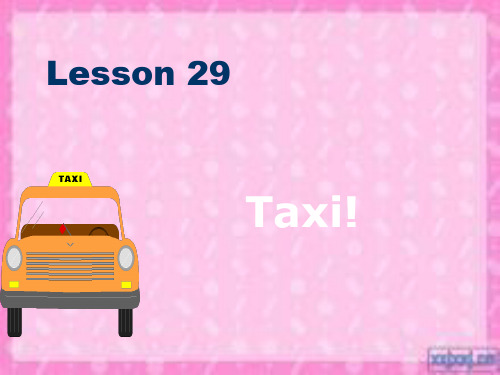
• that 从句在此处是表语从句 • 1.宾语从句中的that省略 • 2.定语从句中的关系词在从句中 做宾语时可以省略。 • The most exciting thing is that we can win the football match. • The happiest thing is that I can visit mother during the Spring.
plough
[plau] 耕地
ploughed 词根:v. plough plough a field 耕田 They plough in spring. 他们在春耕。
ploughed:
adj. 耕过的(地)
• ★lonely adj. 1.偏僻的,人迹罕见的 2.孤单的,寂寞的 a lonely island 一个孤岛 feel lonely感到孤独 • alone 指“独自一个人” adj.\adv. • alone表示单独,独自一个,没有感情色 彩的 live alone独自居住
Special difficulties
• But Captain Fawcett did not take him because the trip was too dangerous. • 弗西特机长之所以不送他去,是因为那段 飞行太危险了
• refuse/deny • refuse拒绝(一个请求或给予的某种东西) • Captain Fawcett has just refused a strange request from a businessman. • deny否认(一种指控) • He denied that he had stolen the money. • 他否认曾偷过钱。
新概念英语第二册lesson 29
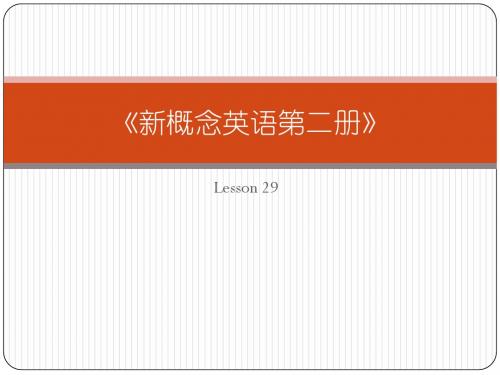
unusual places.
Since then 从那时起 Fly sb./sth. To… 开飞机送某人/某物去…
Drive sb. To… 开车送某人去…
Once he landed on the roof of a block of flats and on another
The ‘taxi’ is a small Swiss aeroplane called a ‘Pilatus Porter’.
Called a ‘Pilatus Porter’是过去分词短语,作aeroplane的定
语。一般过去分词短语作定语时要放在所修饰的名词 /代词后面,而一个单独的分词作定语时则往往防止 所修饰的名词/代词前面。
Block n. 一座大楼,块
Flat n. 公寓房
A block of flats 公寓楼(英国英语)
A block of apartments 公寓楼(美语)
Office block 办公楼 写字楼
Desert v. 废弃 n. 沙漠,不毛之地
Refuse 拒绝(一个请求或给予的某种东西) Refuse sth. / refuse to do sth. Deny 否认(一种指控,做过某事等) Deny doing sth./ deny that+从句
Bring VS. Take
VS.
Fetch
Bring 带来(由某处带来某物),离说话人越来越近 Take 拿走(从某地或某人处带走),离说话人越来越
He landed in a deserted car park.
逐句精讲新概念英语第二册:第29课出租汽车!
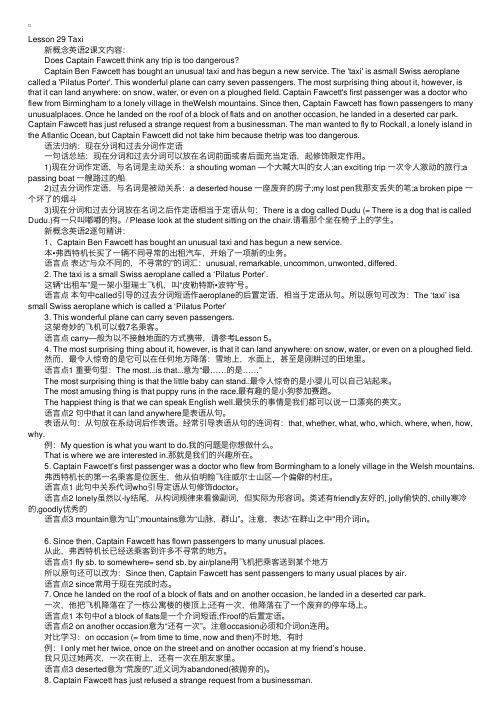
Lesson 29 Taxi 新概念英语2课⽂内容: Does Captain Fawcett think any trip is too dangerous? Captain Ben Fawcett has bought an unusual taxi and has begun a new service. The 'taxi' is asmall Swiss aeroplane called a 'Pilatus Porter'. This wonderful plane can carry seven passengers. The most surprising thing about it, however, is that it can land anywhere: on snow, water, or even on a ploughed field. Captain Fawcett's first passenger was a doctor who flew from Birmingham to a lonely village in theWelsh mountains. Since then, Captain Fawcett has flown passengers to many unusualplaces. Once he landed on the roof of a block of flats and on another occasion, he landed in a deserted car park. Captain Fawcett has just refused a strange request from a businessman. The man wanted to fly to Rockall, a lonely island in the Atlantic Ocean, but Captain Fawcett did not take him because thetrip was too dangerous. 语法归纳:现在分词和过去分词作定语 ⼀句话总结:现在分词和过去分词可以放在名词前⾯或者后⾯充当定语,起修饰限定作⽤。
Lesson29(课件)新概念英语第二册

Cab
Captain Ben Fawcett has bought an unusual taxi and has begun a new service.
本.弗西特机长买了一辆不同寻常的出租汽车, 并开始了一项 新的业务.
长: 他当了五年的足球队长.
He was (the) captain of the football team for five years.
(5)captain v [Tn] be captain of (a football team, etc) 担任(足球队等的)队长: Who is captaining the side today? 今天这队的队长是谁?
在副词或形容词前表示否定含义,强调程度大到了人们不 愿去做 too expensive太贵了(买不起)
I arrived too late and I missed the train.
一般过去时和现在完成时 一般过去时往往强调动作本身,而现在完成
时则表示始于过去并持续到现在的动作或 表示过去不确定的时间发生过的并与现在 有某种联系的动作。
The man wanted to fly to Rockall, a lonely island in the Atlantic Ocean, but Captain Fawcett did not take him because the trip was too dangerous.
这个人想要飞往大西洋上的一个孤岛--罗卡尔岛, 弗西特机长 之所以不送他去, 是因为那段飞行太危险了.
The 'taxi' is a small Swiss aeroplane called a 'Pilatus Porter'.
新概念二lesson29(共38张)PPT课件

22
Language Points
• Captain Ben Fawcett has bought an unusual taxi and has begun a new service.
Байду номын сангаасhe Atlantic Ocean
四大洋
❖the Atlantic Ocean [ət‘læ ntik] 大西洋
❖the Pacific Ocean [pə‘sifik] 太平洋
❖the Arctic Ocean [‘ɑ:ktik] 北冰洋
❖the Indian Ocean
印度洋
Questions: 1. Why does the writer say Captain Ben
• called 在此句中为过去分词 • 过去分词做定语时是作为被动状态来翻译的
block
❖an office block ❖办公大楼
❖Turn left after two blocks.
❖街区
❖a road block
❖障碍物
❖a block in traffic ❖交通阻塞
flat
❖I hope to have a flat of my own. 我希望拥有一套属于 自己的公寓。
land
❖ The plane will land in ❖ V.着陆 five minutes.
❖ The ball landed in the
lake.
❖ V. land in 陷入
❖ That will land him in prison.
新概念英语第二册第29课中文
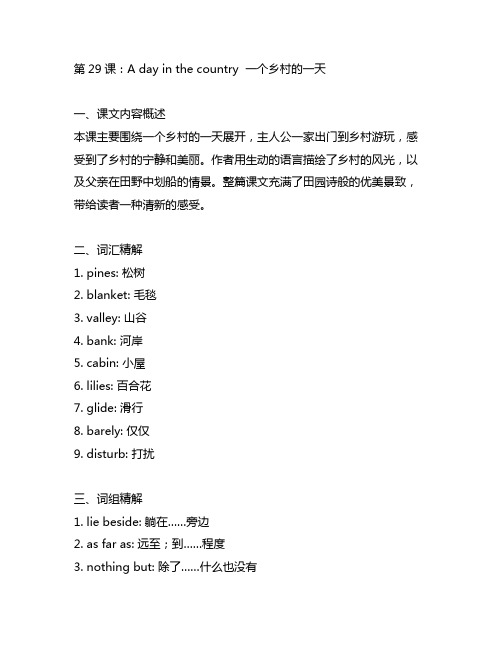
第29课:A day in the country 一个乡村的一天一、课文内容概述本课主要围绕一个乡村的一天展开,主人公一家出门到乡村游玩,感受到了乡村的宁静和美丽。
作者用生动的语言描绘了乡村的风光,以及父亲在田野中划船的情景。
整篇课文充满了田园诗般的优美景致,带给读者一种清新的感受。
二、词汇精解1. pines: 松树2. blanket: 毛毯3. valley: 山谷4. bank: 河岸5. cabin: 小屋6. lilies: 百合花7. glide: 滑行8. barely: 仅仅9. disturb: 打扰三、词组精解1. lie beside: 躺在……旁边2. as far as: 远至;到……程度3. nothing but: 除了……什么也没有4. by the side of: 在……旁边5. at the foot of: 在……的脚下6. less than: 少于7. a great deal: 大量四、重点句型解析1. The boat is floating gently along the river.这艘小船在河上轻轻地滑行。
2. A cool wind was blowing and the sun was shining.一阵凉风吹过,阳光灿烂。
3. In the fields, there were buttercups and d本人sies.田野里有金凤花和雏菊。
4. In the middle of the pond, there were some water lilies.池塘中央有一些睡莲。
五、主题与内容分析本课的主题是乡村风光和家庭出游,展现了乡村诗意的美景和家庭幸福的场景。
通过描述父亲和孩子们在乡村的一天活动,着重描绘了乡村田园风光和舒适宁静的生活状态。
同时也反映了现代都市人对于乡村生活的向往和对于纯朴生活方式的向往。
六、写作原则1. 突出美感,通过新颖生动的描述引入乡村风光;2. 突出家庭情感,通过家庭成员活动刻画家庭和睦;3. 善于运用修辞手法,通过对水域、山风等自然景观的描绘增添文章表现力。
新概念英语第二册第29课taxi

In this way, he has begun his own private ‘telephone service’.
The 'taxi' is a small Swiss aeroplane called a 'Pilatus Porter'.
called 在此句中为过去分词
左拐。
It’s three blocks from my house to school. 从我家到学校有三个街区。
★ flat n.(美)公寓 apartment(英) adj.1.平的,2.扁的,浅的 3.漏气的
(轮胎)
I hope to have a flat of my own. 我希望拥有一套属于自己的公寓房。 The earth is round, not flat. 地球是圆的,不是平的。 The car tires are flat. 这辆汽车的轮胎瘪了。
【结构分析】含现在完成时的简单句, since then 为标志性时间状语。 fly sb. to... 开飞机送某人去 My friend drove me to Tianjin. (drive sb. to开车送某人去)
Once he landed on the roof of a block of flats and on another occasion, he landed in a deserted ca们在春耕。
lonely adj.
★lonely adj. 1.无人烟的,荒凉的,偏 僻的 2.孤单的,寂寞的
The man wanted to fly to Rockall, a lonely island in the Atlantic Ocean.
新概念英语第二册第29课 课文详解、翻译及语法

Lesson 29Taxi!出租汽车First listen and then answer the question.听录音,然后回答以下问题。
Does Captain Fawcett think any trip is too dangerous?Captain Ben Fawcett has bought an unusual taxi and has begun a new service. The 'taxi' is a small Swiss aeroplane called a 'Pilatus Porter'. This wonderful plane can carry seven passengers. The most surprising thing about it, however, is that it can land anywhere: on snow, water, or even on a ploughed field. Captain Fawcett's first passenger was a doctor who flew from Birmingham to a lonely village in the Welsh mountains. Since then, Captain Fawcett has flown passengers to many unusual places. Once he landed on the roof of a block of flats and on another occasion, he landed in a deserted car park. Captain Fawcett has just refused a strange request from a businessman. The man wanted to fly to Rockall, a lonely island in the Atlantic Ocean, but Captain Fawcett did not take him because the trip was too dangerous.New words and expressions 生词和短语taxi n.Pilatus Porterland v.plough v.lonely adj.Welsh adj.roof n.block n.flat n.desert v.参考译文本.弗西特机长买了一辆不同寻常的出租汽车,并开始了一项新的业务。
新概念英语第2册课件Lesson29(共20页)

subjects I have studied. 那不在我所研究的范围之内.
Captain Fawcett's first passenger was a doctor who flew from Birmingham to a lonely village in the Welsh mountains.
它可以再耕过的田里降落。
It can land on a ploughed field.
call sb. sth.叫某人…… be called被称为…… The instrument was called a piano.
过去分词做定语时是作为被动状态来翻译的
I have an instrument called a piano. written English书面语;spoken English口语
This wonderful plane can carry seven passengers. 这架奇妙的飞机可以载7名乘客.
The most surprising thing about it, however, is that it can land anywhere: on snow, water, or even on a ploughed field.
plough a field 耕田 2 [I, Tn] (dated Brit sl 旧, 俚) (cause sb to) fail (an
examination) (使某人)考(试)不及格: 我期末考试不及格.
(完整版)新概念英语第二册第29课taxi

spring 他们在春耕。
lonely adj.
★lonely adj. 1.无人烟的,荒凉的,偏 僻的 2.孤单的,寂寞的
The man wanted to fly to Rockall, a lonely island in the Atlantic Ocean.
这个人要飞往罗卡尔-大西洋上的一个孤岛。 (前置定语)
When his wife and two little children left him, he was very lonely.妻子和两 个孩子离开他以后,他很孤独。(表语)
lonely adj. 孤单的, 人迹罕 见的 alone adj. 单独的,独自的 我独自一人,但我并不孤独。
the roof of the mouth 上颚
roof-roofs
固定搭配:
no roof over one’s head无家可 归under one’s roof住在自己家里 under sb’s roof在某人家做客; 寄人篱下;在某人照应下
ceiling 天花板;顶篷
hit the ceiling/roof [美口] 勃然 大怒,暴跳如雷
desert[di’zə:t] v 废弃,抛弃,遗弃
他抛弃了他的妻子和孩子到 深圳打工了。
He deserted his wife and children and went to work in Shenzhen.
deserted adj. 废弃的
a deserted house 一间废弃工厂 a deserted factory 一个废人 a disabled man
Good morning!
Why is a river rich? A river has two banks(河岸、银行) Which runs faster,heat or cold?Why? cold (感冒,have a running nose)
新概念第二册29课课件

• Have you ever been to London?
• I have never been there.
• The story books written by him are popular with everybody.他写的小说受到大 家的欢迎。
• be called 被称为 • The instrument was
called a clavichord. • e.g. a ploughed field • 被耕过的田 • a deserted car park • 被废弃的车场 • written English 书面语 • spoken English 口语
★taxi n. 出租汽车(美语中 为cab) taxi driver 出租车司机; taxi stand出租车站; by taxi乘出租车 take a taxi to...打的去……
You may take a taxi to the
station. 你可以坐出租车去车站。
• ★land v. 1.着陆2.卸货3.落入 • The plane will land in five minutes.飞机将
• ★ desert v. 废弃,抛弃,遗弃,舍 弃.n. 沙漠
• The village had been hurriedly deserted
• 这个村庄很快被遗弃了.
• He deserted his wife and children and went abroad.
• 他抛弃了妻子儿女,出国去了。
• 5.Once he landed on the roof of a block of flats and on another occasion, he landed in...
新概念英语第二册29课课文原文

新概念英语第二册29课课文原文全文共6篇示例,供读者参考篇1A Day at the SeasideHi there! My name is Tommy, and I'm going to tell you all about the awesome day I had at the seaside with my family last summer. It was totally epic!We woke up super early in the morning, and my little sister Lily was so excited that she could hardly stand still. She kept jumping up and down, saying, "Seaside! Seaside! We're going to the seaside!" Mom and Dad were busy packing our stuff, like towels, sunscreen, and lots of yummy snacks.After what felt like forever, we finally set off in our car. Dad was driving, and Mom kept telling him to slow down because he was going too fast. I just couldn't wait to get there!When we arrived, the first thing we saw was the huge, sparkling blue sea. It was so big and beautiful! I had never seen anything like it before. Lily and I ran towards the water, but Mom stopped us and said we had to put on our swimsuits first.Once we were all ready, we headed straight for the beach. The sand was warm and soft under our feet, and the sun was shining brightly in the sky. Lily and I started building a massive sandcastle, while Mom and Dad set up our little camp with chairs and umbrellas.After a while, we decided to go for a swim in the sea. The water was a bit cold at first, but it felt so refreshing! Lily and I splashed around, and Dad even joined us for a while. Mom preferred to stay on the beach and read her book.When we got hungry, we had a picnic lunch with sandwiches, fruits, and juice boxes. Everything tasted even better at the seaside, probably because of the fresh sea air.In the afternoon, Dad took us for a walk along the beach. We collected all sorts of interesting shells and pebbles. Lily even found a starfish, which she carefully put back in the water after showing it to us.As the day went on, the beach got more and more crowded. There were people swimming, playing games, and flying kites. It was so much fun to watch! I even saw a group of kids building an enormous sandcastle that looked like a real castle from a fairy tale.When the sun started to set, we packed up our things and headed back to the car. We were all tired but happy after such an amazing day. On the way home, Lily and I fell asleep in the backseat, dreaming about our next seaside adventure.That's the story of our day at the seaside. It was truly one of the best days ever! I can't wait to go back again and make more wonderful memories with my family.篇2Lesson 29: A pleasant surpriseOne sunny morning, Tim and his friends went on a school trip to the countryside. They were all excited because they were going to visit a farm. The teacher had told them that they would see many different animals on the farm, such as cows, pigs, and sheep.When they arrived at the farm, the farmer greeted them warmly and showed them around. Tim was especially interested in the sheep. He had never seen a real sheep before, only pictures in his books. The sheep were fluffy and white, and they were happily grazing in the green meadow.After spending some time with the sheep, Tim and his friends moved on to the next place. The farmer took them to a field where there were some cows. The cows were big and brown, and they were peacefully chewing on the grass. Tim was amazed at how gentle and calm the cows looked.Next, they went to the pigsty. The pigs were rolling in the mud and making funny noises. Tim found them quite amusing and couldn't help but giggle. He had seen pigs in cartoons, but seeing them in real life was a completely different experience.The last stop on their farm tour was the chicken coop. Tim was eager to see the chickens. He had always loved watching chickens in the park, but he had never been so close to them. The chickens were pecking at the ground and clucking happily. Tim was fascinated by their colorful feathers and how they moved around.After the farm tour, Tim and his friends sat down for a delicious picnic lunch. They ate sandwiches, fruits, and homemade cookies. The fresh air and the beautiful surroundings made the meal even more enjoyable.Just as they were about to leave, the farmer came up to Tim and handed him a small box. Tim was puzzled and wondered what could be inside. He opened the box and found a fluffywhite feather from one of the sheep they had seen earlier. Tim was overjoyed! He had a special memento from his unforgettable farm visit.On the way back to school, Tim couldn't stop talking about his favorite animals and the surprise gift he had received. His friends listened attentively and shared their own favorite moments from the trip. They were all grateful for the wonderful day they had spent together.That evening, Tim placed the feather on his bedside table, reminding him of the pleasant surprise he had received. He felt lucky to have had such an amazing experience and couldn't wait to visit the farm again one day.篇3A Special Day at the ZooToday was a special day for our class. We went on a field trip to the zoo! I was so excited because I love animals. We woke up early in the morning and got ready to go. I wore my favorite animal t-shirt and comfortable shoes.When we arrived at the zoo, we were greeted by a friendly guide named Mr. Johnson. He was wearing a khaki hat and had abig smile on his face. He told us that he would be showing us around and teaching us about all the amazing animals at the zoo.Our first stop was the lion enclosure. As soon as we approached, we heard a mighty roar. It sent shivers down my spine! Mr. Johnson told us interesting facts about lions. Did you know that they are the kings of the jungle? I thought that was so cool!Next, we visited the monkey house. It was filled with branches and ropes for the monkeys to swing on. We saw them jumping and playing around. They were so funny! Mr. Johnson taught us about different types of monkeys and their habitats. I learned that some monkeys live in the rainforest, while others live in the mountains.After that, we went to see the elephants. They were huge! We watched as they used their long trunks to eat leaves and drink water. Mr. Johnson explained how elephants are the largest land animals and how they are very intelligent too. I was amazed by their size and strength.We took a break for lunch near the giraffe enclosure. We sat on the grass and ate sandwiches while watching the giraffes gracefully walk around. They have such long necks and beautifulpatterns on their bodies. Mr. Johnson told us that giraffes are the tallest animals in the world. I felt lucky to see them up close.In the afternoon, we saw the penguins swimming in their icy pool. They were adorable! Mr. Johnson shared interesting facts about penguins, like how they slide on their bellies and how they can swim very fast. I wished I could be a penguin for a day!Our last stop was the reptile house. Inside, we saw snakes, lizards, and turtles. I must admit, I was a little scared of the snakes, but Mr. Johnson assured us that they were harmless. He taught us about different reptile species and how they survive in different environments.As we headed back to the bus, I couldn't help but feel grateful for this amazing day at the zoo. I learned so much and got to see animals I had only read about in books. It was a day I would never forget.On the bus ride back to school, our teacher asked us to share our favorite animal from the trip. I couldn't decide because I loved them all! But in the end, I said that the giraffes were my favorite because they were so elegant and unique.I will treasure the memories of this special day at the zoo. I hope to visit again soon and continue learning about the incredible creatures that share our planet.篇4The Magic PaintingOnce upon a time, there was a little girl named Emma. Emma loved to draw and paint. She would spend hours with her crayons, creating colorful masterpieces. One day, Emma's grandmother gave her a special gift - a magic painting set.The magic painting set came with a magical paintbrush and a set of paints. Emma was thrilled and couldn't wait to try it out. She sat at her little desk, dipped the brush into the paint, and started to paint a beautiful landscape.To her amazement, as soon as the brush touched the paper, the colors started to come alive! The sky turned into a vibrant blue, the trees swayed in the wind, and the flowers bloomed with stunning shades of red, yellow, and purple. It was like a magical world had come to life on Emma's paper.Excited by the magical painting, Emma decided to explore further. She painted a picture of a cute puppy. As soon as shefinished painting, the puppy wagged its tail and jumped out of the paper, becoming a real, playful puppy! Emma couldn't believe her eyes.From that day on, Emma's paintings became more and more incredible. She painted a majestic castle,篇5Lesson 29: The man who didn't washOnce upon a time, in a small village called Happyville, there lived a man named Tom. Tom was a very lazy man who didn't like to do any work. He was known as "Lazy Tom" by everyone in the village.One day, Tom woke up late and realized he had run out of clean clothes. He searched through his wardrobe, but all his clothes were dirty. Instead篇6A Visit to the CountrysideLast summer, my parents decided it would be good for us to get away from the city for a little while. We were all feeling very tired from work and school, and my mom thought some freshcountry air would do us good. So we packed up our car and set off one Saturday morning to visit my uncle's farm in the countryside.I had been to Uncle Michael's farm a few times before when I was little, but I didn't remember much about it. I knew he had lots of animals like cows, pigs, chickens and sheep. And I knew he grew fruits and vegetables on his land. But that's about all I could recall. I was excited to see what everything would be like through my older eyes.The drive took us about two hours from our home in the city. As we got further away from the tall buildings and busy roads, I started to see more trees, fields, and wide open spaces all around us. It was so different than the view I was used to out my window at home! Instead of cars zooming by, I saw tractors pulling big trailers down the roads. And there were horses and cows grazing lazily in the pastures we passed.When we finally arrived at Uncle Michael's place, I could instantly smell the fresh air. It had a kind of earthy, natural scent that was totally new to my city nose. My uncle was already waiting for us outside his farmhouse, waving cheerfully as we pulled into the driveway."Well hey there, city folks!" he called out with a big grin on his weathered face. "Bet you weren't expecting such a warm welcome committee!"Behind him were gathered all the farm animals - cows, pigs, chickens, sheep, goats, and even a couple of huge draft horses. They seemed just as curious about us as we were about them! The cows were mooing softly, the chickens clucking, and the goats bleating. It was like nothing I'd ever experienced in the city.Uncle Michael gave each of us a big bear hug when we got out of the car. His hands were rough and calloused from years of hard farm work."Come on now, let me show you around!" he said eagerly. "I'll give you the full nickel tour."First he took us over to the pasture to see the cows and horses. I couldn't believe how huge the Clydesdale horses were - they had to be at least six feet tall at the shoulder! The cows were pretty big too, but not quite as enormous. Uncle Michael called them all by name and they ambled right up to the fence to greet him like he was an old friend.Next we went to see the pigs, sheep and goats. The pigs were sleeping under a tree, looking very content. But the goatsand sheep were wide awake and full of energy. A couple of tiny lambs came running right up to me and stared at me with their big innocent eyes. I tentatively reached out to pet one and its wool felt even softer than it looked.Then Uncle Michael took us over to the chicken coops to see his flock of hens. They were totally free to roam around the yard, and they were doing just that - pecking at the ground and chasing after bugs. There were also lots of little chicks that had hatched recently, following their mothers around everywhere they went.After seeing all the animals, we headed over to Uncle Michael's garden next. I couldn't believe how big it was! There were rows and rows of vegetables like corn, tomatoes, carrots, potatoes, greenbeans and more. And there were fruit trees too with apples, pears, peaches and plums hanging from their branches."Feel free to pick whatever you'd like to eat," Uncle Michael told us with a proud smile. "Nothing tastes quite as good as fresh produce straight from the garden."We spent the rest of the afternoon wandering around the farm, exploring all the different areas. I was amazed by just how much work my uncle had to do every single day to keep thewhole place running smoothly. Between taking care of all the animals, tending to the crops, repairing equipment that broke down, and handling dozens of other little jobs, he never had a chance to feel bored!That evening after a delicious home-cooked meal of food that came straight from the farm, we sat out on the porch as the sun was setting. A rooster crowed in the distance and I could hear the gentle lowing of the cows over in the pasture. Fireflies started blinking all around us in the dusky light. I had never experienced anything quite so peaceful in all my life.We ended up spending an entire wonderful week on Uncle Michael's farm that summer. By the time we had to leave to go back home to the city, I had developed a whole new appreciation for where our food comes from and the incredible amount of hard work that farmers like my uncle do every single day. It was an experience I'll never forget!。
新概念英语第二册第29课-Taxi!

新概念英语第二册第29课:Taxi!Lesson 29 自学导读First things first课文详注Further notes on the text1.Thetaxiis a small Swiss aeroplane called aPilatus Porter.这辆“出租汽车”是一架小型瑞士飞机,叫“皮勒特斯波特”号。
(1)taxi加引号是由于它不是一辆真正的出租汽车而是飞机。
(2)Swiss aeroplane是指瑞士生产的飞机。
(3)called aPilatus Porter是个过去分词短语,作aeroplane的定语,在意思上和一个定语从句差不多,即which is called aPilatus Porter。
一般说来,过去分词短语作定语时要放在所修饰的名词/代词之后,而一个单独的分词作定语时则往往放在所修饰的名词/代词前面:It can land on a ploughed field.它可以在耕过的田里降落。
He landed in a deserted car park.他降落在了一个废弃的停车场上。
过去分词ploughed和deserted都位于它们所修饰的名词之前。
2.The most surprising thing about it, however, is that it can land anywhere: on snow, water, or even on a ploughed field. 然而,最令人惊异的是它能够在任何地方降落:雪地上,水面上,甚至刚耕过的田里。
(1)表示转折的连词however可以位于句首、句末或句中,其意义不变。
大多数状况下它位于句中,前后用逗号隔开。
(2)从句that it can land anywhere在句子中起表语作用,是表语从句,that为引导词,it代指this wonderful plane。
(3)on snow, water, or even on a ploughed field是anywhere的同位语,举例说明这架飞机可以在哪些地方降落。
新概念第二册第 29课课件

• Once he landed on the roof of a block of flats and on another occasion, he landed in a deserted car park. Captain Fawcett has just refused a strange request from a businessman, the man wanted him to fly to Rockall, a lonely island in the Atlantic Ocean, but Captain Fawcett did not take him because the trip was too dangerous.
• who 引导定语从句,作主语,不可省略 • fly from … to…. 从 …. 飞到…
• Birmingham
• 伯明翰 ,英格兰中部城市 • lonely • Welsh - Wales • in the Welsh mountains • 在威尔士山脉
• Since then, Captain Fawcett has flown passengers to many unusual places.
Lesson29 Taxi!
• New words and expressions • 1. taxi (n.) 出租汽车 • = cab • take a taxi • taxi-driver • taxi stand • 出租汽车乘车站
• 3. land (n.) 陆地;sea
•
sky
• landlord (n.) 店主,房主
完成。
• a written letter/ a risen sun/ a moved boy
新概念英语第二册Lesson29Taxi!讲义
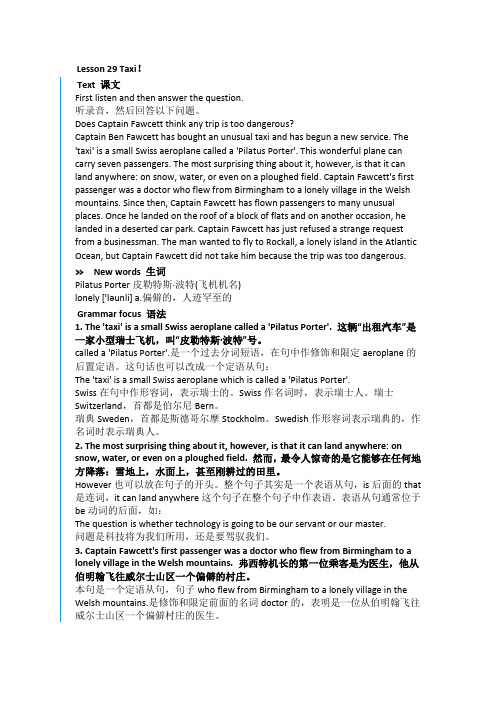
Lesson 29 Taxi!Text 课文First listen and then answer the question.听录音,然后回答以下问题。
Does Captain Fawcett think any trip is too dangerous?Captain Ben Fawcett has bought an unusual taxi and has begun a new service. The 'taxi' is a small Swiss aeroplane called a 'Pilatus Porter'. This wonderful plane can carry seven passengers. The most surprising thing about it, however, is that it can land anywhere: on snow, water, or even on a ploughed field. Captain Fawcett's first passenger was a doctor who flew from Birmingham to a lonely village in the Welsh mountains. Since then, Captain Fawcett has flown passengers to many unusual places. Once he landed on the roof of a block of flats and on another occasion, he landed in a deserted car park. Captain Fawcett has just refused a strange request from a businessman. The man wanted to fly to Rockall, a lonely island in the Atlantic Ocean, but Captain Fawcett did not take him because the trip was too dangerous.New words 生词Pilatus Porter皮勒特斯·波特(飞机机名)lonely ['ləunli] a.偏僻的,人迹罕至的Grammar focus 语法1. The 'taxi' is a small Swiss aeroplane called a 'Pilatus Porter'. 这辆“出租汽车”是一家小型瑞士飞机,叫“皮勒特斯·波特”号。
新概念第二册第29课

lonely [ˈləʊnli]
adj. 寂寞的,孤独的,偏僻的,荒无人烟的 ❖When his wife died, he was very lonely.
他太太去世后他非常孤独。 ❖She has no friends, so she always feels
lonely. 她没有朋友,所以常常感到孤独。 ❖ 自从我最好的朋友离开后,我感到很寂寞。 I felt very lonely when my best friend left. ❖They live a lonely life in the hills. 他们在山里过着寂寞的生活。
3. 用already, yet, just, ever, never这类副词作状语时, 常可用于现在完成时。如:
❖ I have just received a letter from my brother, Tim.
❖ Have you ever been to London? ❖ I have never been there. ❖ Have you had your lunch yet?
农民们在秋天或者春天耕种。 ❖the Plough 北斗七星(BrE) ❖the Big Dipper 北斗七星(AmE) ❖ploughed: adj. 耕过的(地)
Birmingham ['bɜ:mɪŋˌhæm]
n. 伯明翰 (主要指英国中部城市,为英国第二大城市。注:美 国也有同名的城市)
扩:英国主要城市: London (伦敦,位于英格兰英国首都) Birmingham (伯明翰,英格兰中部) Manchester (曼彻斯特,英国西北部) Liverpool (利物浦) Cambridge (剑桥) Oxford (牛津) Edinburgh (爱丁堡) Belfast (贝尔法斯特) Cardiff (卡地夫) Portsmouth (朴茨茅斯)
新概念英语第二册课件Lesson29(共41页)

‘telephone service’.
The 'taxi' is a small Swiss aeroplane called a 'Pilatus Porter'.
called 在此句中为过去分词
过去分词做定语时是作为被动 状态来翻译的, ing表示正在
The earth is round, not flat. 地球是圆的,不是平的。
The car tires are flat. 这辆汽车的轮胎瘪了。
New words
taxi
alone
land
dessert
plough
field
lonely
disable
roof
deserted
desert
Captain Ben Fawcett
Today’s story
Main Character: Captain Ben Fawcett Story: He has just bought an
unusual taxi
1. What is the ‘taxi’ in fact? 2. How many passengers can it
carry? ➢ 5. Where has Captain Fawcett
ever landed?
Language Points
Captain Ben Fawcett has bought an unusual taxi and has begun a new service.
un-: 前缀,不,未,非,反 Eg: able—unable, happy-unhappy lucky—unlucky 就这样,他开始了自己的私人“电话服务”。
- 1、下载文档前请自行甄别文档内容的完整性,平台不提供额外的编辑、内容补充、找答案等附加服务。
- 2、"仅部分预览"的文档,不可在线预览部分如存在完整性等问题,可反馈申请退款(可完整预览的文档不适用该条件!)。
- 3、如文档侵犯您的权益,请联系客服反馈,我们会尽快为您处理(人工客服工作时间:9:00-18:30)。
the Atlantic Ocean Review: 四大洋 the Atlantic Ocean [ət‘læntik] 大西洋 the Pacific Ocean [pə‘sifik] 太平洋 the Arctic Ocean [‘ɑ:ktik] 北冰洋 the Indian Ocean 印度洋
Tell the story Captain Fawcett – unusual – new service ‘taxi’ – Swiss – ‘Pilatus Porter’ wonderful – seven passengers most surprising – land anywhere first – doctor – Birmingham – mountains Since then – flown – unusual places Once – flats – another – car park refused – strange – businessman wanted – Rockall – Atlantic – didn’t take – dangerous
occasion [əˈkeɪʒn] n. 场合,时机,时刻,理由 I only wear a tie on special occasions. 我只在特殊场合系领带。 He was not at home on that occasion. 那时他正好不在家。 I’ve met her on several occasions recently. 我最近见到过她好几次。 You have no occasion to buy another car. 你没有必要再买一辆车。
lonely 扩:与另一个近义词alone的区别: 仔细想想下面这句话,比较两词的不同: I lived alone, but I didn’t feel lonely. 我虽然单独一人生活,但我并不感到寂寞。 lonely 强调感觉上的孤独寂寞,是种不好的感觉。 但alone强调形式上的孤单,没有不好的感觉。 She watches TV when she is alone. 她单独一人时便看电视。 I can do it alone. 我可以独自一人办理此事。
deserted [dɪˈzɜ:tɪd] adj. 被遗弃的,荒芜的 联想:desert n. 沙漠,荒野 v. 遗弃,抛弃 deserted city 荒凉的城市
lonely [ˈləʊnli] adj. 寂寞的,孤独的,偏僻的,荒无人烟的 When his wife died, he was very lonely. 他太太去世后他非常孤独。 She has no friends, so she always feels lonely. 她没有朋友,所以常常感到孤独。 自从我最好的朋友离开后,我感到很寂寞。 I felt very lonely when my best friend left. They live a lonely life in the hills. 他们在山里过着寂寞的生活。
Birmingham ['bɜ:mɪŋˌhæm]
n. 伯明翰 (主要指英国中部城市,为英国第二大城市。注:美 国也有同名的城市) 扩:英国主要城市: London (伦敦,位于英格兰英国首都) Birmingham (伯明翰,英格兰中部) Manchester (曼彻斯特,英国西北部) Liverpool (利物浦) Cambridge (剑桥) Oxford (牛津) Edinburgh (爱丁堡) Belfast (贝尔法斯特) Cardiff (卡地夫) Portsmouth (朴茨茅斯)
Key structures 现在完成时 & 一般过去时 中时间状语的比较 1. 现在完成时的时间状语多表示到现在为止的这段时 间:since+某一时间,for+一段时间,up till now, just, before等。 2. 一般过去时表示过去某时发生的动作,时间状语多 为last year (month), ago (3 years ago), in + 某一年,just now等。 I saw him in 1994. I haven’t seen him since 1994. I saw him 3 years ago. I haven’t seen him for 3 years.
passenger [ˈpæsɪndʒə(r)] n. 乘客,旅客 This bus can carry 50 passengers. 这辆公交车能载50名乘客。
land
[lænd]
v. 着陆,登陆 The plane will land in five minutes. 飞机将在五分钟后降落。 The pilot landed the plane safely. 飞行员将飞机安全着陆。 The ball landed in the lake. 球落入湖中。
Grammar Box 2 worked in a bank ---- Have you ever worked in a bank? ---- I worked in one for two months once. owned a horse driven a Toyota stayed at a hotel kept a cat had a bad cold
block [blɒk] n. 大楼,大厦,街区,阻塞,障碍物 an office block 办公大楼 Turn left after two blocks. 走过两个街区后左拐。 a block in the pipes. 管道阻塞 a road block 路障 a block of rock 一块岩石 a block in traffic 交通阻塞
Listen and answer
Does Captain Fawcett think any trip is too dangerous? Yes, he does. He once refused to fly to Rockall.
Text
Captain Ben Fawcett has bought an unusual taxi and has begun a new service. The 'taxi' is a small Swiss aeroplane called a 'Pilatus Porter'. This wonderful plane can carry seven passengers. The most surprising thing about it, however, is that it can land anywhere: on snow, water, or even on a ploughed field. Captain Fawcett's first passenger was a doctor who flew from Birmingham to a lonely village in the Welsh mountains. Since then, Captain Fawcett has flown passengers to many unusual places. Once he landed on the roof of a block of flats and on another occasion, he landed in a deserted car park. Captain Fawcett has just refused a strange request from a businessman. The man wanted to fly to Rockall, a lonely island in the Atlantic Ocean, but Captain Fawcett did not take him because the trip was too dangerous.
Key structures
He stayed at this hotel last month. Have you ever stayed at this hotel? I went abroad last year. Up till now, I have never been abroad before. 3. 用already, yet, just, ever, never这类副词作状语时, 常可用于现在完成时。如: I have just received a letter from my brother, Tim. Have you ever been to London? I have never been there. Have you had your lunch yet?
Grammar Box 3 No one’s seen Tim – he’s moved ---- Has anyone seen Tim? ---- He hasn’t been seen since he moved. cleared the path – it’s snowed dusted the room – the maid’s left missed Mary – she’s gone away mended the stereo – Jane’s broken it
Lesson 29 Taxi!
Preview
How often do you take a taxi? What is the advantage(优 势) or disadvantage of icture
taxi [ˈtæksi] n. 出租车 He called a taxi for me. 他给我叫了辆出租车。 by taxi 乘出租车 taxi stand (AmE)出租车站 taxi driver 出租车司机 take a taxi to … 打车去… 他每天早上打车上学。 He takes a taxi to school every morning. He goes to school by taxi every morning.
